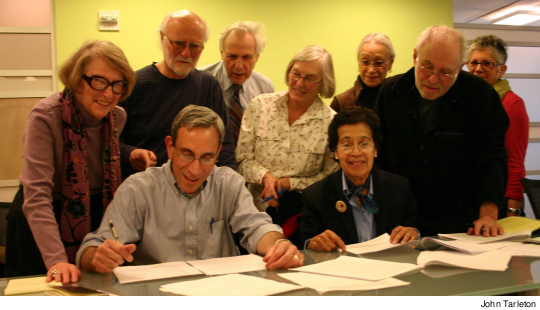 |
For labor unions and other progressive social movements, the creation of a safety net to protect the elderly from the financial perils of old age was one of the 20th century’s great achievements. But today the future of popular programs like Social Security and Medicare is in danger.
In Washington, support for “entitlement cuts” has become the yardstick by which the political and media establishments measure whether a politician or pundit is “serious.” Fearmongering about budget deficits dominates the discussion, and more sober analysis is too rarely heard.
EDUCATION
The PSC Retirees Chapter has responded by launching an educational campaign for union members about what Social Security and Medicare do, how they are financed, and how they are being targeted by conservative ideologues who resent the very existence of such government-run initiatives.
“People need to know what is at stake,” says Steve Leberstein, co-chair of the Social Safety Net Working Group.
Enacted in 1935, Social Security is widely considered the most effective anti-poverty program in US history. At the end of 2010, fifty-four million Americans were receiving Social Security benefits, including more than 3.2 million New Yorkers. While retirees make up about two-thirds of beneficiaries, the program is also a vital resource for millions of disabled workers and children who have lost a parent.
TRUST FUND
Social Security is financed directly by payroll taxes that workers pay into a general trust fund; it does not contribute to the federal deficit. Even with no changes, the program is already projected to be solvent until at least 2037. Lifting the cap on what high earners contribute (payroll taxes are now only levied on the first $106,800 in earnings), would leave it solvent until 2080 or longer.
Republicans (and some Democrats) are calling, instead, for future benefits to be cut. House Speaker John Boehner (R-Ohio) has suggested the retirement age should be upped to 70 by the middle of the century; President Obama’s deficit commission recommended raising it to 69 and slashing benefits by up to a third for middle-class retirees. Many critics of Social Security would also like to see the program wholly or partially privatized by diverting payroll taxes into individual accounts that would be managed on commission by investment firms. While President Bush’s effort to move in this direction was soundly defeated, the idea is still alive in Washington and on Wall Street.
In early April, House Republicans startled many observers when they unveiled a sweeping plan to dismantle the guaranteed health care benefits provided by Medicare and replace them with vouchers that could only be spent on private insurance plans. The plan was authored by Rep. Paul Ryan (R-Wis.) – a self-proclaimed fan of the far-right writer Ayn Rand, who favored abolition of both Social Security and Medicare.
“The logic of where we are going is dystopian,” said John Hyland, the other co-chair of the Social Safety Net Working Group. “The Right’s underlying idea is that there’s no society, just an agglomeration of individuals.” The political forces targeting Social Security, Medicare and public-sector pensions “are anti-tenure and anti-public higher education” as well, Hyland added.
Younger and middle-aged workers have the most to lose, said Leberstein, since politicians will seek to avoid the ire of present-day recipients. An increase in the retirement age, he noted, would force people to stay in their jobs longer, which will make it harder for younger people to get good jobs.
UNION-WIDE PROJECT
The Retirees Chapter formed the Working Group in October and, in February, the PSC Executive Council voted to make it a union-wide project. Subcommittees have been formed to research and prepare basic explanatory materials on Social Security, health care and public-sector pensions, respectively.
Leberstein expects the papers to be completed by the end of the semester. They will then be compiled into a small pamphlet that will also inform people about how they can take action.
Members of the Social Safety Net Working Group spoke at PSC chapter meetings at City Tech on April 14, and the CUNY Central Office on March 3.
“People felt it was very informative,” said Greg Dunkel, chair of the Central Office chapter. “A lot of members had thought Social Security was going bankrupt.”
The Safety Net Working Group is looking to schedule speaking appearances at the other CUNY campuses as well as to organize a CUNY-wide forum on the issue for the fall. Leberstein said the group will also be working closely with activists in other unions.
More information is online at http://www.psc-cuny.org/our-campaigns/defend-social-safety-net.

